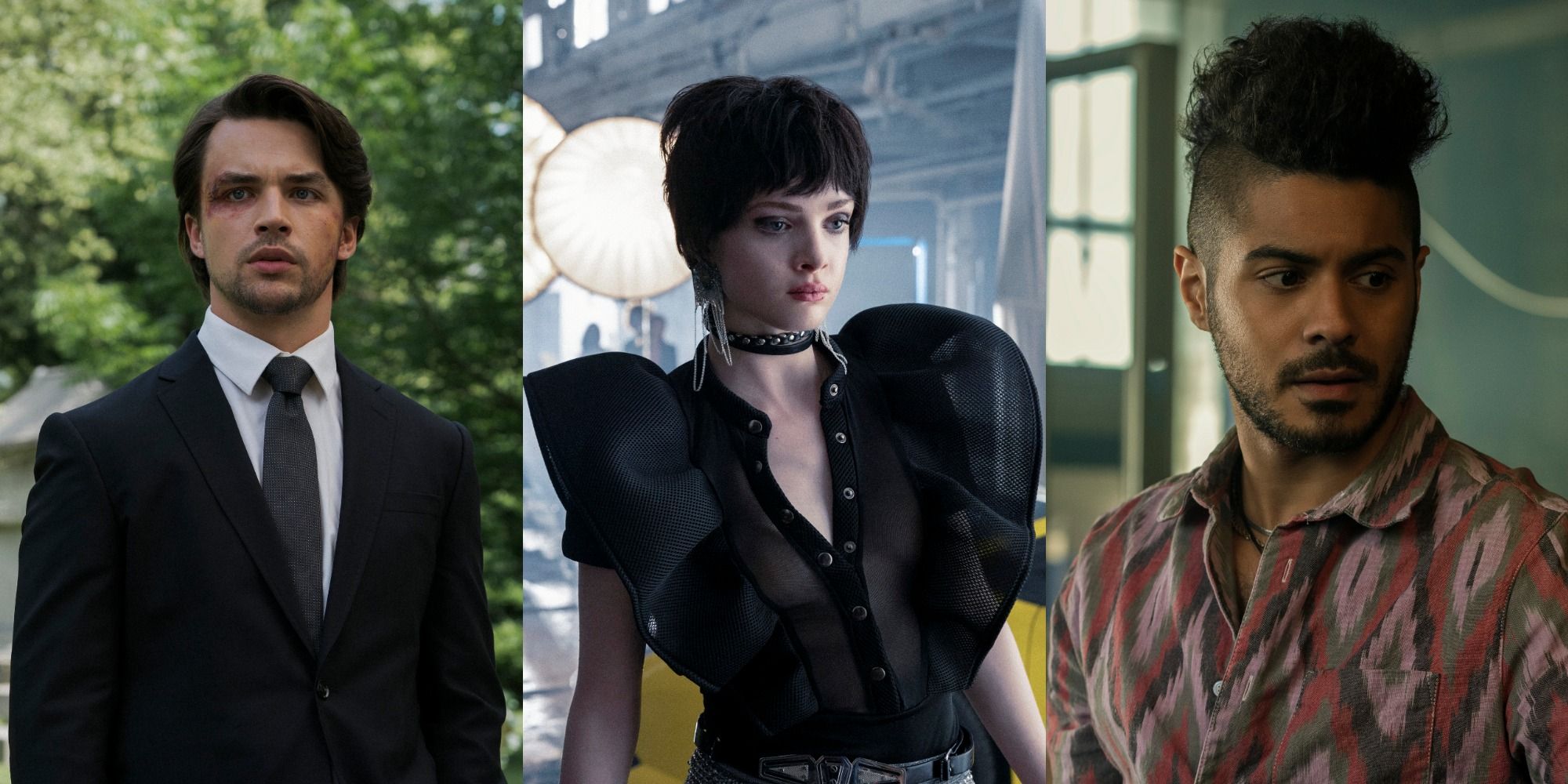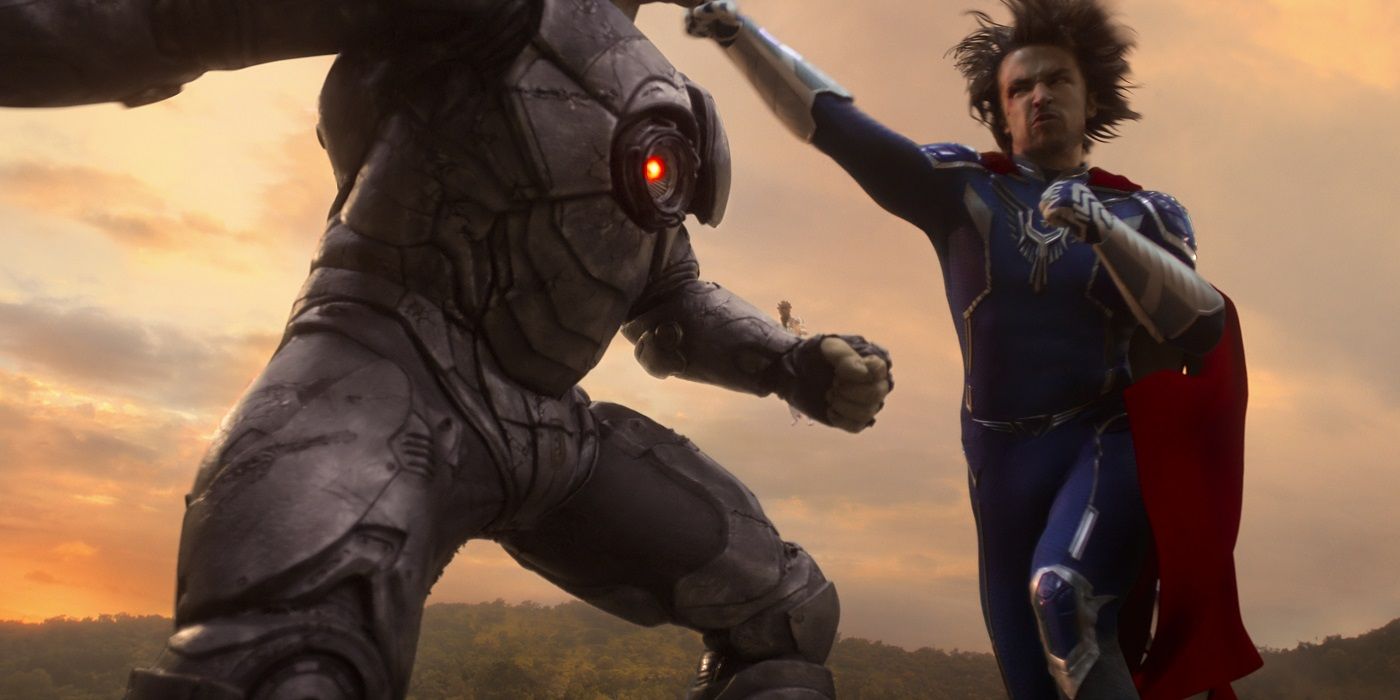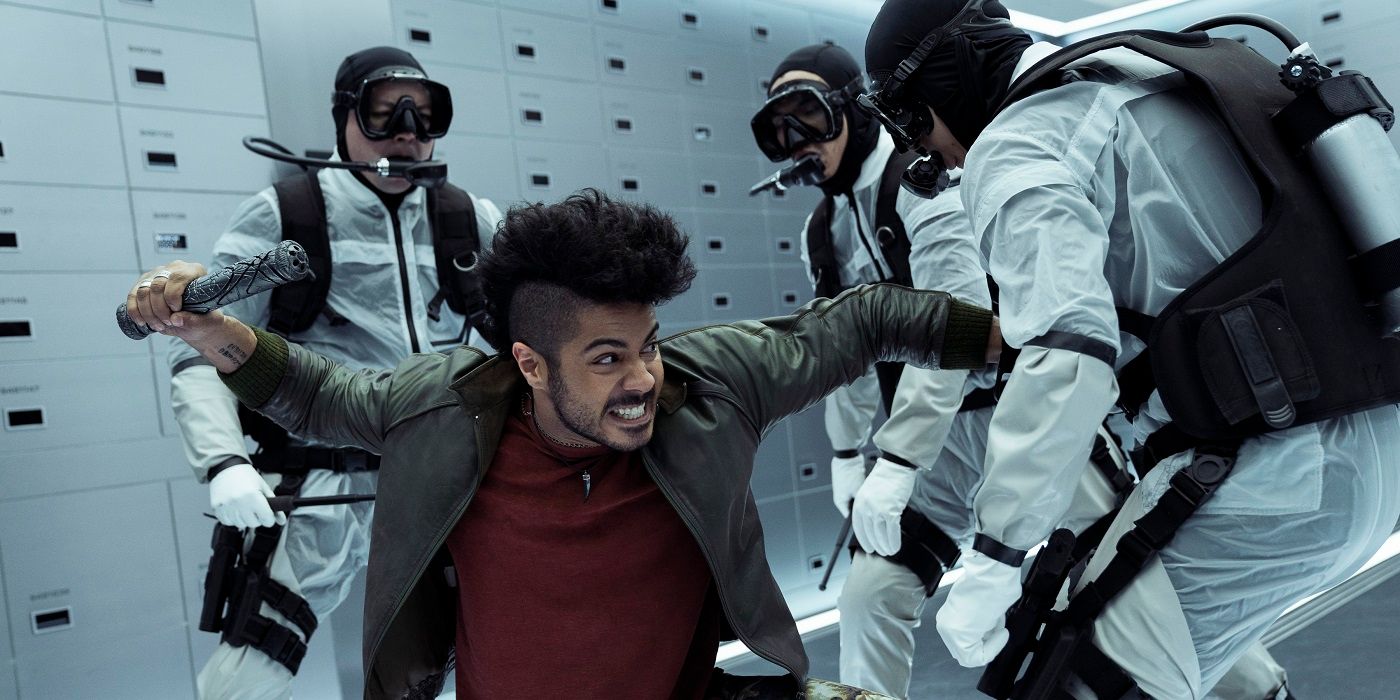Warning! Mild spoilers ahead for Jupiter’s Legacy season 1.
Adapted from the comic book series by Mark Millar and artist Frank Quitely, Jupiter’s Legacy is now a live-action TV show on Netflix. The new series spans multiple decades and questions superheroes’ place in society and the struggles of growing up in the shadow of superhero parents and their legacies.
The series stars Andrew Horton as Brandon Sampson (aka, Paragon), the son of Josh Duhamel's Utopian and Leslie Bibb's Lady Liberty, Elena Kampouris as Chloe Sampson, Brandon's sister who shunned the superhero life, and Ian Quinlan as Hutch Hutchence, Skyfox's son who's a con man looking for his father. Jupiter's Legacy follows their journeys as they figure out who they are outside of their parents' legacies and the struggles of living up to some very high expectations.
Screen Rant, along with other media outlets, had the chance to speak to Kampouris, Horton, and Quinlan about Jupiter's Legacy, their characters' journeys, the Union of Justice's code and more.
For Andrew, being the son of The Utopian and pretty much the de facto leader of the younger generation, a lot of pressure is on Brandon's shoulders. There's also that little bit of an internal crisis about not knowing how to deal with the code and everything. How is that preparing for that role and knowing the overall things that are going to happen?
Andrew Horton: Knowing the overall things that were going to happen made playing out what happens in season 1 so much more enjoyable than I think if I'd just gone in as Brandon is in the comic books. We encountered Brandon as this much more emotionally complex guy. And he's really, as you say, the guy who's in charge with the younger generation. In terms of preparation, that was physical. I spent a lot of time in the gym to get bigger for the part, because you want to look like a superhero, as well as pretending to be one.
I broke down all of my scenes and did something called intensioning — you write down what motivates you in that scene and why, and I found myself putting together playlists to match certain scenes as well, to get me into a particular emotional state should I need it. But also, reading the comics beforehand to prepare to see the journey that Brandon goes on. He kind of sees the world with rose tinted glasses. So to be playing that required me to play slightly younger than my actual playing age as well, which was fun, to then sort of develop and mature more as we go forward.
Jupiter's Legacy is based on a graphic novel. Did you do any reading to prepare for your roles? How did you delve into your characters?
Ian Quinlan: I'm a big fan of Mark Millar. I grew up reading a lot of his stuff. I grew up reading Civil War, The Authority. When I read for this part, it felt very familiar. I was like, 'Oh, I think I understand what this is.' And then when I was testing for it, I realized its Mark. And then I was like, 'Oh, I definitely know the themes that he's exploring here.' And I definitely know the idea of values meets politics meets how do you have the ideal versus how do you implement it. So I went and read Jupiter's Legacy. And I was like, 'Oh, this is exactly on par and on brand with Mark,' and I knew exactly where to go from that. So I went to work on trying to figure out how Hutch fits into this dynamic where you have this somewhat didactic code that has been established for 100 years. And then, who's the guy that's going to drive a bus through that wall?
Elena, how was it jumping into these shoes, especially the superhero moments when you fly? How was that for you? Is it a dream come true?
Elena Kampouris: I did not grow up reading comics, though I love Mark's movies. But I was busy having tea parties [laughs] But when this project came along, and I googled Jupiter's Legacy, and I recognized the names behind this and then I saw the pictures and the visceral images... I was like, 'Oh, shoot, this is amazing!' I love this cool character of Chloe and I researched all that I could. I did not read the comics until after I booked it because, as I've said before, I don't like to read the books because then I get too attached and then I get possessive and I'm like, if I don't book this thing, my heart will be crushed. So I don't want to get too emotionally invested, because it's possible. But then once I booked it, I was like, finding out everything she does: her abilities, her family, I want to know what she eats for lunch.
Then in bringing her character to life through the training, it was very exciting for me because I loved the training aspect of it. We got ready like a month or so before we started shooting — we were doing Wushu, Filipino martial arts, Krav Maga, all kinds of things. That was really cool to delve into all these cultures through training. I personally love Chinese traditional ballet. A big thing that was overcoming my fear of heights because it gives me heart palpitations. But once I got in [the harnesses], it was riding up, chafing in areas, so I was very uncomfortable. However, we had an excellent stunt team, we got a great crew on the show. They walked me through it, I eventually conquered it and I felt liberated, I felt empowered. So that was just a highlight.
Andrew, I was wondering if you can tell me a little bit about the code that's on the show, and how your opinion of the code changes over the course of the story.
Andrew Horton: Yeah, so the code [are] these guidelines, which are set out by the Utopian and the original [members] once they received their powers. And it's essentially to do good, to not interfere with political and social, religious dynamics that are within the world, within the country, and it's to not kill. So, it's a pretty broad code that they have, but it's fairly specific in terms of not interfering, and not killing. And above all, doing good. And for Brandon, that is what he lives his life by. He aspires to be his father. And in the present day, what the younger generation are finding is that the code feels slightly outdated and maybe some of the ideals that have been upheld for so long aren't necessarily in keeping with how they want to see the Union going forward.
For Brandon, what particularly changes his opinion, without giving too much away, is the fact that there's a big event within the show, where it's a matter of life or death for his parents, and he chooses to save them at the expense of someone else's life. And that fundamentally changes him. It changes his parents' opinions of him, it changes his peers' perspectives of him as well. It really makes him question well, what's worth more: my parents and my friends or someone who is out there to take us all down? Brandon, by the end of the series, is completely disillusioned by the code and is disillusioned by his father and is maybe looking to move from the Union perhaps.
Ian, how did Hutch end up with the power rod that was originally Richard's, aka Blue Bolt?
Ian Quinlan: I'm not sure how much I can say about this, but, I'm surprised that you caught that. It's right there in front of us, I don't know why nobody has seen Blue Bolt holding it and then me holding it. Nobody's drawn that connection yet. Good question. I'm trying to figure out how to answer this without giving away any spoilers… I would say kudos to you for catching it. And then I'm gonna throw the question back at you. Is it the same power rod? It's obvious that Hutch is worthy.
Ian, the two things that we sort of know about the character is that he's a supervillain's kid and that he has a badass power rod. Can you talk about playing a supervillain's child and how the two main elements of your character are indirectly addressed and will presumably be addressed in a different season. How was it playing something that you didn't even get to answer?
Ian Quinlan: I think there was like there were two driving factors both kind of related to my father. So we see that George is not in the Union anymore. He's on the run, he's on the lam. So that creates two problems for Hutch. One, the Union broke his family up and ruined his life essentially, or left him fatherless, leaving him stranded to pick up the pieces and have to fend for himself from day one. So you'll notice that my father might be on the lam, but where's the Union been in my family this whole time? Nobody came to visit, why does nobody know who I am? And so you got this kid who grew up fighting for everything because this Union destroyed his family. Simultaneously, we will come to find that the situation wasn't so black and white, like everything in Jupiter's Legacy and that actually the Union might actually have something to atone for, and that their legacy might be a complete and utter sham along with this code, along with the Utopian. I, as Hutch, am also on the search for answers, both from my father and both from the Utopian and the Union, to perhaps expose the counter-narrative to their so-called legacy.
What I love about this universe and about the show in general is the authenticity of the characters and the very raw and real relationships between the characters. Elena and Andrew, can you talk to me about building this relationship?
Elena Kampouris: Well, that is the relationship isn't it? It is a classic kind of Shakespearean familial brother-sister kind of thing going on here. There's a lot to unpack. Reading the comics and delving into that world, that mythology, I was like, 'okay, there was an arc here, we got to live up to this to make sure it comes off the page.' Luckily, in meeting the wonderful cast that we have and Andrew playing my brother, there was a chemistry there and I felt his support. There were so many swirling emotions that are in the scenes that we have together and that I felt from him. It excited me because I found layers that we were discovering in the moment that we were kind of expounding off of what was on the page; and that's the most exciting thing.
This is a really important relationship in the show. He's her older brother, they're both protective over one another, I think she feels like she sees him. She's trying to warn him like, 'Bro, stop it, you're not going to be able to live up to this idea that it's impossible to live up to. It's perfection, it does not exist. It's a symbol and it's just going to destroy you. I'm already destroying myself. She's in a self-destructive mode and it's because she's just feeling so much pain. And she's just navigating these different coping mechanisms and self-sabotaging herself, but she doesn't want her brother to go down that route. But, it's a beautiful relationship.
Andrew Horton: I would echo what Elena said. But, what's interesting about the real-life relationship between us as well, as with Chloe and Brandon in the series, Chloe has much more experience in a lot of areas of life than Brandon does. Like Elena is a much more experienced actor than I am and to get to work off someone else's expertise like that and then to have that coming into the scene was amazing because this was my first big job. So to be working with actors of such a high caliber and then have them raise your own game, as Chloe is trying to help Brandon, Elena helped me to raise my performance. So, there's nice little bleeds from real life to the screen.
Ian, you were the only child of the original six so far that we've seen that doesn't have any powers? If you could have your own what would they be. That's not anybody else's just yours.
Ian Quinlan: I really, really do like the ability to teleport like the movie Jumper. I could just go anywhere and have a million vacation homes like one of the stuff I've stolen and just be able to go anywhere. Wake up every morning and surf in a different country and then go to dinner in a different country every other night.



